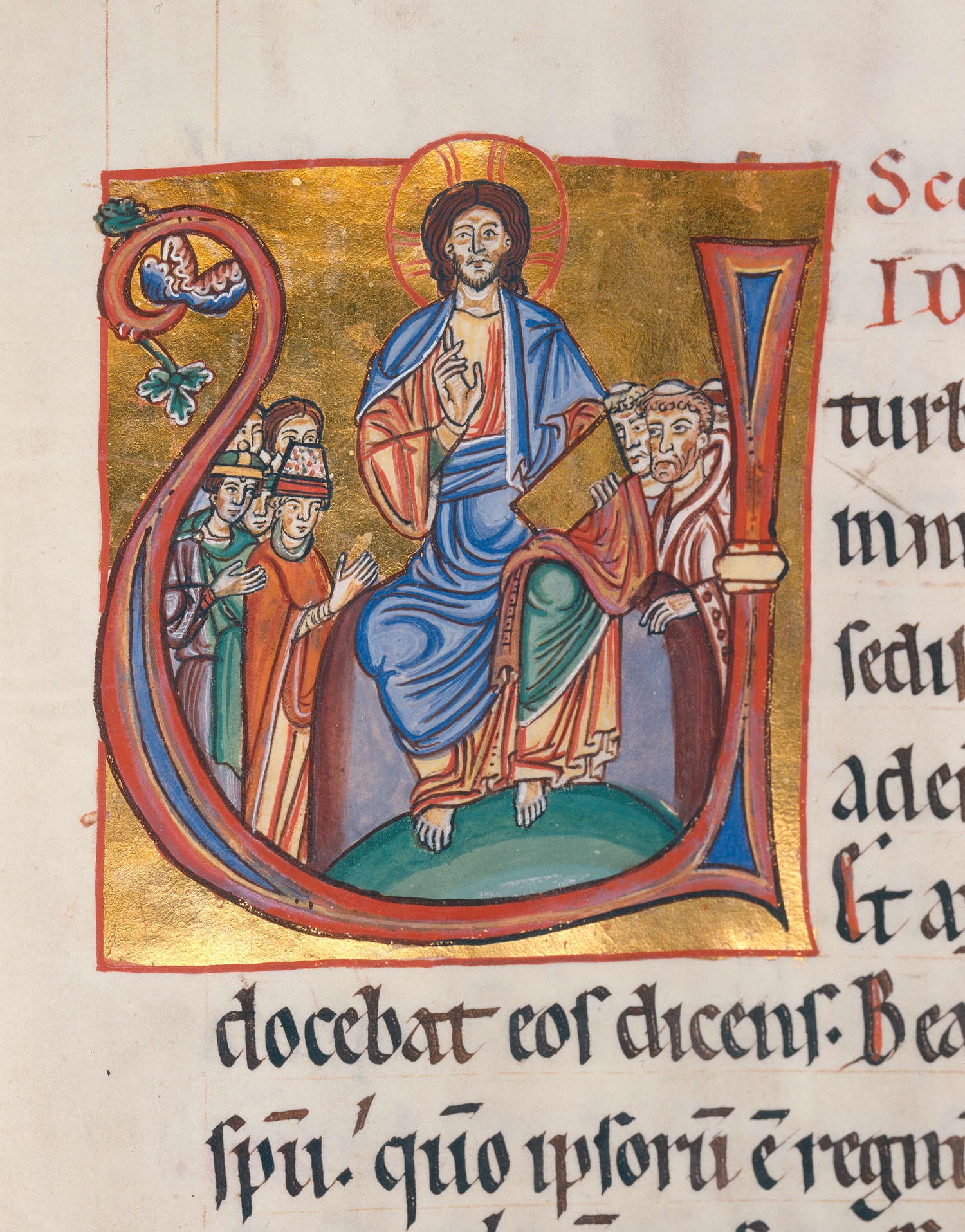«The modern reader conceives of the page as a plate that inks the mind, and of the mind as a screen onto which the page is projected and from which, at a flip, it can fade. For the monastic reader, whom Hugh addresses, reading is a much less phantasmagoric and much more carnal activity: the reader understands the lines by moving to their beat, remembers them by recapturing their rhythm, and thinks of them in terms of putting them into his mouth and chewing. No wonder that pre-university monasteries are described to us in various sources as the dwelling places of mumblers and munchers.»
The Air Is an Immense Library. Another Pedagogy of Ivan Illich
10/10/2023
In the sound of what Illich calls 'communities of mumblers,’ we can hear forms of societies that are more flexible, more undisciplined, connected in less hierarchical ways, and more inclined to form what he also calls in Deschooling Society 'threads of learning.'

Multifaceted thinker—philosopher, theologian, and educator—Ivan Illich (1926-2002) is best remembered for his diatribes against the school system, the Church, health systems (which he called the Medical Nemesis) or modern industries and their voracious consumption of energy; all those institutions that, in his opinion, sustained the "certainties of modernity." The breadth of his criticism and the radical nature of his ideas made him a highly controversial thinker at the end of the last century, so it is curious that, just when the problems he pointed out decades ago have become more acute, Illich has become a somewhat marginal or dated philosopher, even in a country like Mexico where he encouraged so many conversations, mainly through the Intercultural Training Center, later called Intercultural Documentation Center, active in Cuernavaca from 1961 to 1976. Perhaps the historical punctuality of his criticisms has hindered their intergenerational transcendence, or perhaps nowadays, in times of quasi-apocalyptic fury, his anti-industrial conviction is naive. The passage from his more openly militant activity (symbolized by texts such as Deschooling Society, Alternatives to Schooling, or Medical Nemesis, written in the seventies), to the erudite recollection of a text such as In the Vineyard of the Text, which takes up his youthful fondness for medieval studies, thus becomes the ideal opportunity to articulate a more surreptitious Illich and, perhaps, with a quieter and more threatening edge.
Pedagogy of the Vibratile
There is a pedagogy hidden from attentive ears in the less obvious Ivan Illich. It is not the famous Illich of Deschooling Society (1971) but that of In the Vineyard of the Text (1993), a less famous book but one that the thinker himself considered his most successful work. In it, we find a pedagogy that we will defend here as phonological, a pedagogy of the vibratile, of resonances and murmurs. It is a pedagogy that, almost unintentionally, could serve as a support for the decentered, dispersed, and, of course, unschooled social model of his studies of previous decades. In the sound of what Illich calls 'communities of mumblers,’ we can hear forms of societies that are more flexible, more undisciplined, connected in less hierarchical ways, and more inclined to form what he also calls in Deschooling Society 'threads of learning.' 1
Already the very term ‘mumblers,’ with that almost comical onomatopoeic basis, gives the key to the characteristics of Illich's community. In it, the book has not ceased to be a material node, and its signs, therefore, have not been disembodied; the text, in short, has not been "separated from the physical reality of the page." Correlatively, in the realm of the mumbler "every murmur, every roar of words is [...] one of the sites of understanding, otherness and knowledge."2 Thus, by the constant interweaving of these barely intelligible sonorities, the air is transformed into "an immense library." [3] The mumblers and the books that originate their murmurings form threads as material as ephemeral, which require the active participation of each of its members and, above all, their dynamic listening.
Silent Reading
The central thesis of In the Vineyard of the Text is surprising, coming from an idea that seems so minuscule and everyday but whose causes and consequences are highly significant: Illich studies the historical moment in which reading began to be a silent practice. No more, no less. Certainly, Illich details, "silent reading was occasionally practiced in antiquity, but it was considered a feat. Quintilian speaks with admiration of one scribe who can visualize a whole sentence before reading it out, aloud." Augustine, centuries later, "was puzzled by his teacher Ambrose, who occasionally read a book without moving his lips. Scribes usually copied books as they were dictated by another. When they were alone, in front of the original, they read it out loud, transcribing as much as they could keep in their auditive memory." The scriptoria of the early monasteries, he sums up, "were noisy places."

Illich introduces us to a scenario loaded with signs tied to their bodily enunciations: to a dynamic that, to be meaningful, requires articulated air, means to move it, and membranes to decode it. To a scenario that we associate more with the tumultuous exchange of the market than with the convent.
At this point, we could agree that there must have been a dialectic that counterbalanced the extroverted moment of this collective reading to allow for its meditative moment. But, Illich explains, drawing on Hugo de San Victor, meditation was an "intensive reading activity and not some passive quietist plunge into feelings." Meditation is thus described "by analogy to body movements":
Illich establishes a clear differentiation with the modern reader, and yet he does not make the modern printing press and its moving and "phantasmagoric" type the historical turning point of silent reading. At what point, then, did that reflective recollection that we recognize today as a sine qua non of intellectual or meditative activity occur? Illich dates a series of historical changes around the 12th century: "Around 1140 a page is turned. In the civilization of the book, the monastic page closes and the scholastic page opens." A technique to fabricate a new plastic, paper, was imported from China, and with this began the "alphabetic arrangement of key words, subject indexing, and a kind of page layout suited for silent scanning." Then a technique that came to the European continent from Ireland in the 7th century took on a new dimension: leaving spaces between individual words. A surprising discovery by Illich, but logical with his approach: "As this technique became common, monastic scriptoria became silent. Copyists could grasp single words with their eyes as if they were ideograms and transfer them to the page on which they were working."
In this twelfth century of new materials, the first truly portable books are built: this lightweight device is accompanied by a flow of narrative that has been cut, in turn, into paragraphs. Previously, if one leafed through a book "hoping to find a certain passage, there exists little more chance of happening upon it than if the book had been opened randomly." Now, through "the new page layout, chapter division, distinctions, the consistent numbering of chapter and verse, the new table of contents for the book as a whole, the summaries at the beginning of the chapter referring to its subtitles, the introductions in which the author explains how he will build up his argument," etc., echoes "a new will to order" with resonances in architecture, law, economics, and new cities, "but nowhere as clearly as on the page."
In the context of the Gregorian Reformation, which would have as its final effect what is now known as the Revolution of the twelfth century, writing also began to be done in the vernacular languages and not exclusively in Latin; translating everyday speech into alphabetic signs allows it to be conceived as a spelling of one's thoughts and a sort of abstraction of language becomes generalized: its actual pronunciation is now only one of its facets. The shapes that thus appeared on the pages, Illich summarizes, became less "triggers for sound patterns than visual symbols of concepts.” And readers no longer approached the book "as a vineyard, a garden, or the landscape for an adventuresome pilgrimage," but as a treasury, a mine, or a storage-room. We now find ourselves before the searchable text, before "a screen for the order willed by the mind." Centuries before the printing press and the Cartesian cogito, and certainly through a gradual, slow, and complex process, that goes beyond the mere context of the monastic book, mental life begins its recollection, its path of abstraction towards solipsism and sensible closure. The sign deflates until it becomes a silent ghost.

The Community of Mumblers
I said that In the Vineyard of the Text there is a hidden pedagogy because, by showing the historical turn of reading, it denaturalizes what we consider its inherent characteristics. I am not interested here in proposing a return to "the old reading practice" because such an exercise is sterile and, ultimately, impossible; nor do I seek to hierarchize modes of reading. It is enough for now to show the displacement proposed by Illich because it allows us to foresee future displacements, and possible paths of transformation for community practices. Behind the erudition of In the Vineyard of the Text, one can perceive, to use Paulo Freire's term, 'viable unknown’4 or, better said in this context, 'viable unheard'—that is, I believe that Illich's community, more than a testimony of the past, describes a route to be built in the future.
I recover Freire's interesting concept because I consider it a strongly materialistic and anti-utopian concept, in the sense that, in order to be realized, it does not depend on transcendent conditions or arbitrary orderings. The viable unknown is articulated with given conditions, determined, not for that reason less open to unforeseeable transformations. The denaturalization opened up by the Illichean mumbling can help us to imagine both new types of communities and listening practices that help to shape them. One issue why I consider the community of the mumblers as a viable unheard and not a mere scholarly or historiographical curiosity, is that its communitarian character hangs on strange structures, even for what we normally consider a monastic life: there is something in its resonance that exceeds even the dialectic between an internal or external meditation, between the "monastic page" and the "scholastic."
-Peter the Venerable (1092/1095-1156) sits at night in his bed indefatigably chewing the Scriptures by turning them over in his mouth during the night hours.
-Between midnight prayers and dawn, John of Gorze (died 976), “like a bee quietly hums the Psalms without interruption.”
-For Gregory the Great, "Sacred Scripture is sometimes food, sometimes drink for us. Reading them, one finds honey indeed when one tastes the sweetness of holy understanding."
-Bernard of Clairvaux recounts in a letter how his heart was burning in him all night, "and a fire lighted up my meditation," as he read the Scripture in preparation for his homily.

The examples Illich collects show us religious in solitary experiences that, however, when enunciated, that is, embodied, can go beyond the walls of the monastic building. The murmurs of these medieval bees share a location but do not necessarily form an audience: they draw on the same source, the Scripture, but their illocutionary exercise overflows in heterogeneous sensitive waves. They are by no means individual, as liberalism would understand them centuries later, but neither are they hermetically sealed in a homogeneous collectivity, as perhaps Christianity itself would wish. These examples are closer to the singular-plural tension that Jean-Luc Nancy would propose close to the writing of In the Vineyard of the Text, after the ruin of the Soviet experience and its state collectivization, but also with the inescapable signs of neoliberal malaise and its isolating and depoliticizing individuality.
The element that makes this tension irreducible, that does not allow it to be resolved in a synthesis, is the sound itself. As if it were a piece by Charles Ives—and his famous unanswered question, without synthesis, precisely—the sound layers of the community of mumblers temporarily overlap in the air, form a body of greater complexity on the fly and, with the same lightness, separate and disperse again. The signs of the library of the air form such dynamic wefts, strange even to the individual's own body, which also reaches a moment of dispersion.
«We know that when Bernard spoke, told, or dictated a passage, his amanuensis listened and mumbled. He picked up Bernard’s dictation, and—in the conception of his time—then dictated it by mumbling to his own hand: The scribe’s mouth guided the hand that held the stylus.»
I believe that we have not reached the level of estrangement of Abbot Bernard's body, because his mumbling is a sound that we will only hear in the future. That is the path that teaches sound, its vibratile pedagogy, the political thread waiting to conform, that is to say, to pronounce itself.

